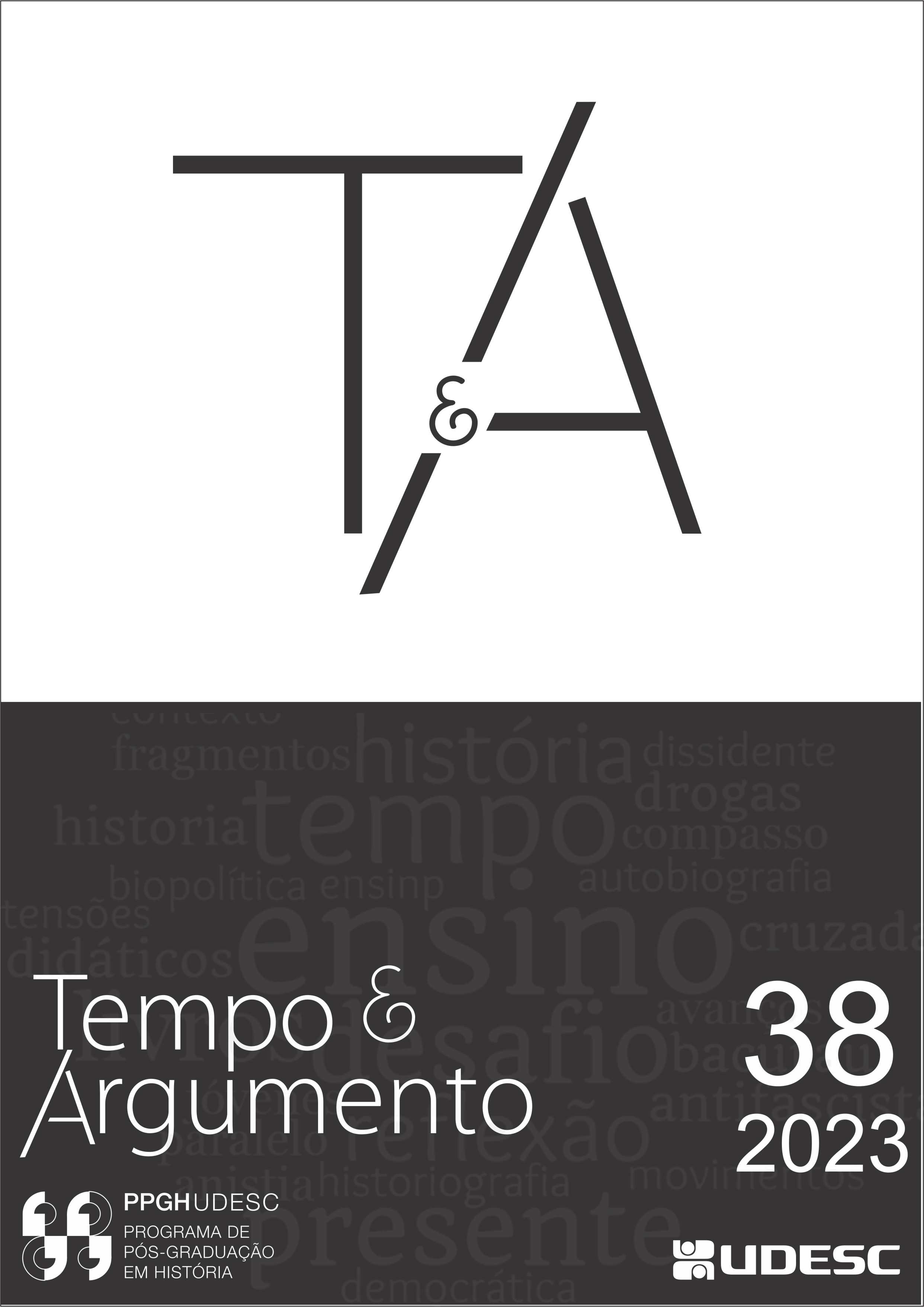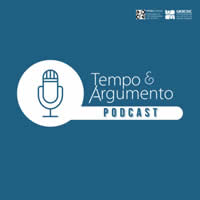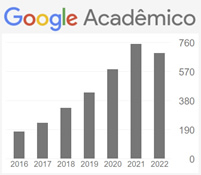The story that Bacurau teaches us to teach to be "people"
DOI:
https://doi.org/10.5965/2175180315382023e0102Keywords:
knowledge and power, history teaching, Bacurau, historical literacyAbstract
This article has the film “Bacurau” as a possibility of use for teaching History starting form a dystopian time, to think a history of time in the present tense not disconnected front its past. We understand that these intersecting time dimensions can be worked on in teaching and learning practices based on the concept of historical literacy. Understanding the film's plot as a cultural artifact, it is understood that, from its diverse narratives, times and spaces intersected by the inhabitants and outsiders of Bacurau, it is possible to identify and problematize the threads that lead to an understanding of historiographic concepts that favor historical learning based on the complexity of historical thinking and awareness for students in basic education. We understand these students as classroom partners who can share with each other and with the teacher previous knowledge identified in the practical life of the characters in the film and reflect on their own identities, the exercise of citizenship and the everyday experiences historically constituted to build new strategies for life and resistance to Eurocentric historical thinking that continues to colonize our bodies, minds and habits. It is expected that when working with the film, teachers and their classroom partners will assume the role of history researchers with a view to developing their own historical knowledge related to historical cognition.
Downloads
References
ALBUQUERQUE Jr., Durval Muniz. Bacurau: será mesmo resistência? Saiba Mais. [S.l.], 15 set. 2010. Disponível em: https://www.saibamais.jor.br/bacurau-sera-mesmo-resistencia/. Acesso em: 02 fev. 2020.
ANDRADE, Breno Gontijo; RODRIGUES JUNIOR, Gilmar; ARAÚJO, Alexis Nascimento; PEREIRA, Junia Sales. Empatia histórica em sala de aula: relato e análise de uma prática complementar de se ensinar/aprender a história. História & Ensino, Londrina, v. 2, n. 17, p. 257-282, jul./dez. 201. Disponível em: https://www.uel.br/revistas/uel/index.php/histensino/article/view/16600. Acesso em: 31 out 2021.
AUSUBEL, David. Aquisição e retenção do conhecimento: uma perspectiva cognitiva. Lisboa: Editora Plátano, 2003.
BACURAU. Direção: Kleber Mendonça Filho; Juliano Dorneles. Produção: SBS Productions, CinemaScópio e Globo Filmes. Intérpretes: Sônia Braga, Udo Kier, Bárbara Colen, Thomas Aquino, Silvero Pereira, Thardelly Lima, Rubens Santos, Wilson Rabel et al. Roteiro: Kleber Mendonça Filho; Juliano Dorneles. Brasil. Distribuição: Vitrine Filmes (Brasil) e SBS Distribuition (França). 2019. 1 DVD (131 min).
BARCA, Isabel. Literacia e consciência histórica. Educar em Revista, Curitiba: Editora UFPR, v. 22, p. 93-112. 2006. Número especial. Disponível em: https://moodle.ufsc.br/pluginfile.php/571589/mod_resource/content/1/artigo%20Isabel%20Barca.pdf. Acesso: 20 fev. 2021.
BASTOS, Felipe; GONÇALVES, Eduardo. “Quem nasce em Bacurau é gente?” Gênero e precariedade de vida no filme Bacurau. Revista Digital do LAV, Santa Maria: UFSM, v. 13, n. 2, p. 236-253, maio/ago. 2020. Disponível em: https://periodicos.ufsm.br/revislav/article/viewFile/44052/pdf. Acesso: 15 fev. 2021.
BUTLER, Judith. Problemas de gênero: feminismo e subversão da identidade. Rio de Janeiro: Civilização Brasileira, 2003.
CARVALHAL, André. Bacurau é aqui e quem nasce em Bacurau é ... a gente. Carta Capital, São Paulo, 05 set. 2019. Disponível em: https://www.cartacapital.com.br/opiniao/bacurau-e-aqui-e-quem-nasce-em-bacurau-e-a-gente/. Acesso: 02 fevereiro de 2020.
DOSSE, François. História do tempo presente e historiografia. Revista Tempo e Argumento, Florianópolis, v. 4, n. 1, p. 5-22, jan./jun. 2012. Disponível em: file:///C:/Users/franc/Downloads/HISTORIA_DO_TEMPO_PRESENTE_E_HISTORIOGRAFIA.pdf. Acesso: 30 jan. 2020.
FERRO, Marc. O filme: uma contra-análise da sociedade? In: LE GOFF, Jacques; NORA, Pierre. História: novos objetos. Rio de Janeiro: Francisco Alves, 1995. p. 199-215.
FOUCAULT, Michel. Vigiar e punir: o nascimento da prisão. Petrópolis, Vozes, 1987.
FOUCAULT, Michel. A coragem da verdade. São Paulo: Martins Fontes, 2011.
FOUCAULT, Michel. A arqueologia do saber. Rio de Janeiro: forense, 2016a.
FOUCAULT, Michel. As palavras e as coisas: uma arqueologia das ciências humanas. São Paulo: Martins Fontes, 2016b.
FOUCAULT, Michel. Des espaces autres. Tunísia, 1967. In: FOUCAULT, Michel. Dits et écrit: II. 1976-1988. Paris: Gallimard. 2017a. p. 1571-1581.
FOUCAULT, Michel. História da sexualidade III: o uso dos prazeres. São Paulo: Paz e Terra, 2017b.
FOUCAULT, Michel. Questions à Michel Foucault sur la géographie. In: FOUCAULT, Michel. Dits et écrit: II. 1976-1988. Paris: Gallimard. 2017c. p. 28-40.
FOUCAULT, Michel. Sur les façons d’écrire l’histoire. In: FOUCAULT, Michel. Dits et écrit: I. 1954-1975. Paris: Gallimard, 2017d. p. 613-628.
FREIRE, Paulo. Educação como prática de liberdade. Rio de Janeiro: Paz e Terra, 1967.
HADDAD, Fernando. Bacurau não é um filme sobre o imperialismo, mas sobre nós mesmos. Folha de São Paulo, São Paulo, 28 set. 2019. Disponível em: https://www1.folha.uol.com.br/colunas/fernando-haddad/2019/09/bacurau.shtml?origin=uol. Acesso em: 01 fev. 2020.
LE GOFF, Jacques. História e memória. 7. ed. Campinas: Editora da Unicamp, 2013.
LEE, Peter. Progressão da compreensão dos alunos em história. In: BARCA, Isabel. (org.). Perspectivas em educação histórica. Braga: CEEP, Universidade do Minho, 2001. p. 13-27.
LEE, Peter. Educação Histórica, consciência histórica e Literacia histórica. In: BARCA, lsabel. (org.) Estudos de consciência histórica na Europa, Ásia e América. Braga: Uniminho. 2008.
LEE, Peter. Putting Principles into Practice: Understanding History. In: HOW STUDENTS LEARN: History in the classroom. Washington: The national academies press, 2005. p. 31-77.
LEE, Peter. Em direção ao conceito de literacia histórica. Educar em Revista, Curitiba: Editora UFPR, p.131-150, 2006. Especial. Disponível em: https://revistas.ufpr.br/educar/article/view/5543. Acesso em: 25 fev. 2021.
LEE, Peter. Literacia histórica e história transformativa. Educar em Revista, Curitiba, n. 60, p. 107-146, abr./jun. 2016.
CERTEAU, Michel de. A invenção do cotidiano: artes de fazer. Petrópolis: Vozes, 2014.
MAGNOLI, Demétrio. 'Bacurau' é testemunho da extinção de vida inteligente na esquerda brasileira. Folha de S. Paulo, São Paulo, 15 set. 2019. Disponível em: https://www1.folha.uol.com.br/ilustrada/2019/09/bacurau-e-testemunho-da-extincao-de-vida-inteligente-na-esquerda-brasileira.shtml. Acesso em: 03 fev. 2020.
MOREIRA, Marco Antonio. Aprendizagem significativa. Brasília: Universidade de Brasília. 1999.
MULLER, Helena Isabel. História do tempo presente: algumas reflexões. In: PÔRTO JR., Gilson. História do tempo presente. Bauru: Edusc, 2007. p. 17-30.
PEREIRA, Nilton Mullet. Ensino de história e resistência: notas sobre uma história menor. Revista @rquivo Brasileiro de Educação, Belo Horizonte, v. 5, n.10, p. 103-117, jan./abr. 2017. Disponível em: http://periodicos.pucminas.br/index.php/arquivobrasileiroeducacao/article/view/P.2318-7344.2017v5n10p103. Acesso em: 15 fev. 2021.
RICOEUR, Paul. Tempo e narrativa: tomo III. Campinas: Papirus, 1997.
RICOEUR, Paul. A memória, a história, o esquecimento. Campinas: Editora da UNICAMP, 2007.
RÜSEN, Jörn. Experiência interpretação, orientação: as três dimensões da aprendizagem histórica. In: SCHMIDT Auxiliadora; BARCA Isabel; MARTINS Estevão Rezende (orgs.). Jörn Rüsen e o ensino de história. Curitiba: Ed. UFPR, 2011. p. 79-92.
SANTOS, Myriam Sepúlveda dos. Memória coletiva, trauma e cultura: um debate. REVISTA USP, São Paulo, n. 98, p. 51-68, jun./ago. 2013. Disponível em: file:///C:/Users/franc/Downloads/69270-Texto%20do%20artigo-91578-1-10-20131220.pdf. Acesso em: 15 fev. 2021
SOUZA, Éder Cristiano de. Cinema e educação histórica: jovens e sua relação com a história em filmes. 2014. Tese (Doutorado em Educação) − Universidade Federal do Paraná, Curitiba, 2014. Disponível em: http://www.ppge.ufpr.br/teses/d2014_Eder%20Cristiano%20de%20Souza.pdf. Acesso em: 03 jan. 2021.
SCHMIDT, Maria Auxiliadora; GARCIA, Tânia Braga. Apresentação. Educar em revista, Curitiba, , p. 01-02, 2006. Número especial. Disponível em: https://revistas.ufpr.br/educar/issue/view/251/showToc. Acesso em: 02 fev. 2021.
SCHMIDT, Maria Auxiliadora. O historiador e a pesquisa em educação histórica. Educar em Revista, Curitiba, Brasil, v. 35, n. 74, p. 35-53, mar./abr. 2019. Disponível em: https://revistas.ufpr.br/educar/issue/view/2501/showToc. Acesso em: 02 de fevereiro de 2021.
SILVA, Marcos. Depois da ditadura: cidades brasileiras de cinema (Cidade de Deus, Cidade bixa e O céu de Suely). In: SILVA, Marcos; RAMOS, Alcides Freire (orgs.). Ver história: o ensino vai aos filmes. São Paulo: Hucitec, 2011. p. 191-208.
SWAIN, Tania Navarro. Para além do sexo, por uma estética da liberação. In: ALBUQUERQUE Jr, Durval Muniz; VEIGA-NETO, Alfredo; SOUZA FILHO, Alípio. Cartografias de Foucault. Belo Horizonte: Autêntica, 2011. p. 393-406.
SZLACHTA JUNIOR, Analdo Martins; RAMOS, Márcia Elisa Teté. As contribuições da Históry Education para a pesquisa em ensino de História. In: ANDRADE, Juliana Alves; PEREIRA, Nilton Muleet. Ensino de história e suas práticas de pesquisa. São Leopoldo: OIKOS, 2021. p. 96-113.
VEYNE, Paul. Foucault: seu pensamento, sua pessoa. Rio de Janeiro: Civilização Brasileira, 2014.
ZANOTO, Gizele. Aprender com o cinema, aprender sobre o cinema: a sétima arte e o ensino de história. In: VALÉRIO, Mairon Escorsi; RIBEIRO JUNIOR, Halferd Carlos. Ensino de história: memória e identidade. Jundiaí: Paco Editorial: 2016. p. 31-46.
Published
How to Cite
Issue
Section
License
Copyright (c) 2023 Tempo e Argumento

This work is licensed under a Creative Commons Attribution-NonCommercial 4.0 International License.
The articles published by the magazine are for free use, destined for educational purposes and not commercial. The copyrights are all granted to the magazine. The articles whose authors are identified represent the expressed opinion of its authors and not the official position of the Tempo e Argumento magazine or of the Postgraduate Program in History of the Universidade do Estado de Santa Catarina.




